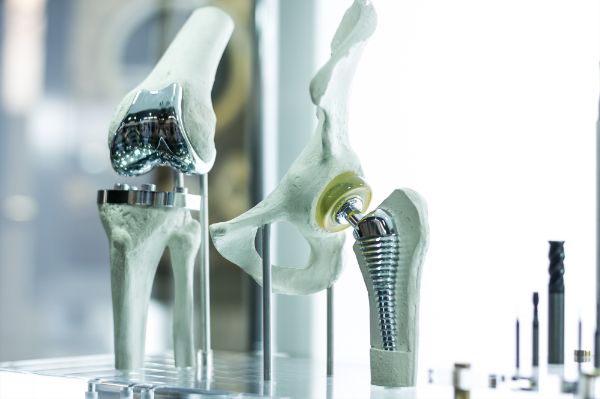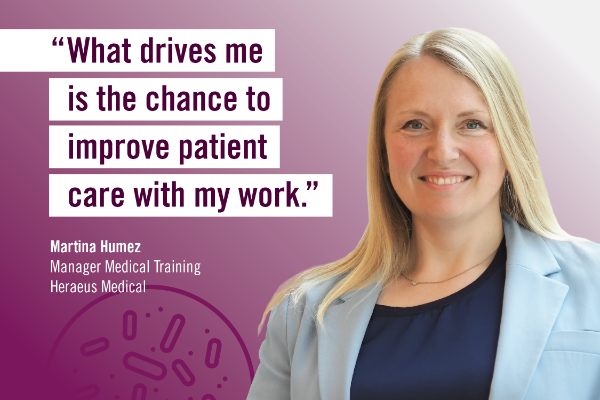The microbiologist: Martina Humez is
researching artificial joints
Bone cement is used when artificial joints are anchored in the body. This is the specialty of Martina Humez. She is particularly interested in orthopaedics, and her research contributes to the further development of this field. “It motivates me greatly when I can improve patient care with my work,” she says. In addition, the microbiologist trains medical personnel and her colleagues in the field.
Martina Humez is Manager Medical Training at Heraeus Medical. This operating company of Heraeus is a leader in the field of bone cements and biomaterials for surgical orthopaedics and trauma surgery. “Thanks to modern surgical and anchoring techniques, endoprostheses, i.e. artificial joints, can now remain in the body for longer and longer,” explains Humez. “The use of antibiotic-containing bone cement reduces the risk of infection.” Humez teaches doctors and operating room staff what is important in this context – from the scientific principles to the specifications of various products. She is also doing a doctorate in microbiology. Her doctoral thesis is closely related to her professional work: it is about antibiotic-loaded bone cement.
Focus on women patients
The scientist is keen to draw attention to the differences between female and male patients in training sessions and lectures. Women with osteoporosis, for example, are a high-risk group, she emphasizes: “Taking these conditions into account can make a big difference for the patient concerned.”
Humez is convinced that women in research and development teams can help to better take into account such gender-specific aspects and to avoid distortions, so-called gender bias effects, which ultimately work to the detriment of patients or users. “I realize that, as a woman, I have a greater focus on this topic than most men, and that is why it is important to me to raise awareness of it,” she says.

Driven by curiosity
Humez has learned to assert herself as a woman in a male-dominated professional environment. "Sometimes you need a thick skin, but over time I have become more confident," she says. What needs to happen to encourage more young women to pursue STEM (science, technology, engineering, and mathematics) careers? Humez believes that home and school play a crucial role. "In elementary school, I had a teacher who seriously claimed that girls were too stupid for math," she recalls. I really believed him until a math teacher in seventh grade proved the opposite. From then on, I got good grades in math.
Humez's interest in science was practically in the cradle. Her parents had a farm. "In that environment, nature and technology go hand in hand," she explains. Whether it was identifying a certain plant, driving a tractor, or building a log cabin, she learned most things by doing. I was always very curious," says the 37-year-old. "And I've kept that childlike curiosity to this day. After all, you can learn something new every day."
Curiosity, openness and a love of learning: Humez also wants to instill these qualities in her two children – and she is clearly succeeding: when she recently returned from a conference, her little daughter greeted her with a self-made “Pixi book” in which the six-year-old had put her childish view of the world of microbiology on paper. “She picks up an incredible amount when I work from home,” says Humez. “She just wants to know everything, and I try to be a role model and mentor for her.”
Humez is proud of her dual role as a scientist and a mother. And she is grateful that Heraeus, as an employer, promotes the compatibility of family and career. A return to the academic world is therefore out of the question for her. “Many people don't even know that you can do very good research and development in industry,” says the biologist. “With a scientific career, you really have an incredible number of opportunities in a company like Heraeus.”

This article is part of a series of articles in which Heraeus is making women in STEM professions visible. We are introducing female experts who are involved in innovative projects.


